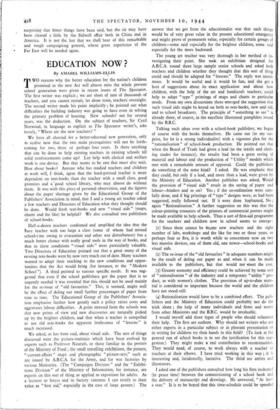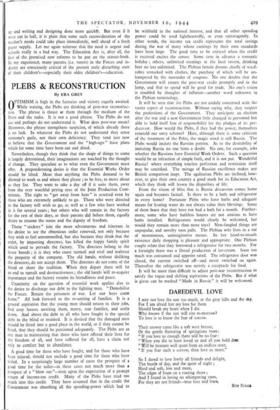' EDUCATION NOW ?
By AMABEL WILLIAMS-ELLIS
TWO reasons why the better education for the nation's children promised in the new Act will almost miss the whole present school generation were given in recent issues of The Spectator. The first writer was explicit ; we are short of tens of thousands of teachers, and you cannot recruit, let alone train, teachers overnight. The second writer made his point implicitly ; he pointed out what difficulties the building industry was going to have even in solving the primary problem of housing. New schools? not for several years, was the deduction. On the subject of teachers, Sir Cyril Norwood, in language as explicit as The Spectator writer's, asks tersely, " Where are the new teachers? "
We have all cheered for a better-educated new generation, only to realise now that the two main prerequisites will not be forth- coming for two, three or perhaps four years. Is there anything that can be done to help existing teachers in existing schools till solid reinforcements come up? Lay help with clerical and welfare work is one device. But that seems to be one that must also wait. How about books? Anyone who has studied teachers and children at work will, I think, agree that the hard-pressed teacher is more dependent on text-books than the teacher with a small class, good premises and a 'good school library, who may almost do without them. It was with this piece of personal observation, and the figures about the paper shortage given by the Educational Group of the Publishers' Association in mind, that I and a young art teacher asked a few teachers and Directors of Education what they thought should be done. Would fresh text-books and new " visual aids " (maps, charts and the like) be helpful? We also consulted two publishers of school-books.
Half-a-dozen teachers confirmed and amplified the idea that the busy teacher with too large a class (some of whom had missed school-t: me owing to evacuation and other war disturbances) has a much better chance with really good tools in the way of books, and that in these conditions " visual aids " were particularly valuable. Two Directors of Education poiined out that a great many of the existing text-books were by now very much out of date. Many teachers wanted to adapt their teaching to the new conditions and oppor- tunities that the Act would bring (for instance, to the " Modern School "). A third pointed to various specific needs. It was sug- gested that even if the school publishers got the paper that is so urgently needed it was essential that this should not be used mainly for the re-issue of "old favourites." This, it seemed, might well be the effect of doling out small further percentages of paper from time to time. The Educational Group of the Publishers' Associa- tion emphasise further how greatly such a policy raises costs and aggravates labour difficulties. A point stressed from the schools was that new points of view and new discoveries are naturally picked up by the brighter children, and that when a teacher is compelled to use old text-books the apparent irrelevance of " lessons " is much increased.
We asked, as has been said, about visual aids. The sort of things discussed were the picture-statistics which have been evolved by experts such as Professor Neurath, or those familiar in the posters of the Ministry of Food ; the small travelling exhibitions, the posters, " current-affairs " maps and photographic " picture-sets," such as are issued by A.B.C.A. for the Army, and for war factories by various Ministries. (The " Campaigns Division " and the " Exhibi- tions Division" of the Ministry of Information, for instance, are experts on this sort of thing as applied to exposition for adults. As a lecturer to forces and in factory canteens I can testify to their value as " first aid," especially in the case of large groups.) The answer that we got from the educationalist was that such things would be of very great value in the present educational emergency and might prove of permanent value, especially for certain groups of children—some said especially for the brighter children, some said especially for the more backward.
The young art teacher was very thorough in her method of in- vestigating their point. She took an exhibition designed for A.B.C.A. round three large sample senior schools and asked both teachers and children whether they thought that this sort of thing could and should be adapted for " lessons." The reply was unani- mous. It would be useful and it would be fun, and she got a host of suggestions about its exact application and about how children, with the help of the art and handicraft teachers,' could help to adapt " type " printings of maps and charts to particular needs. From my own discussions there emerged the suggestion that such visual aids might be keyed on both to text-books, new and old, and to school broadcasts. The principle of " something to see " is already there, of course, in the excellent illustrated pamphlets issued by the B.B.C.
Talking such ideas over with a school-book publisher, we began of course with the books themselves. He .came out (to my sur- prise, for he is a strong individualist) with a vigorous plea for the " rationalisation" of school-book production. He pointed out that when the Board of Trade had given a lead (to the textile and cloth- ing trades for instance), the results had been a great saving of material and labour and the production of " Utility " models which met with a remarkable amount of approval. Could the publishers do something of the same kind? I asked. He was emphatic that they could, but only if a lead, and more than a lead, were given by the Ministry of Education. Another publisher was asked, Would the provision of " visual aids" result in the saving of paper and labour—binders and so on? Yes ; if the co-ordination were care- fully done, and if big printings of " type " designs were, as had been suggested, really followed out. If it were done haphazard, No ; again " Rationalisation." A further suggestion on this was that the colour-printing resources of the printers of commercial posters might be made available to help schools. Thus a sort of first-aid programme for the teachers and children now in school seems to ernerge:
(i) Since there cannot be 6o,000 new teachers and the right number of labs, workshops and the like for two or three years, or perhaps four or five, it is worth while to concentrate now on two less massive devices, one of them old, one newer—school-books and visual aids.
(2) The re-issue of the "old favourites " in adequate numbers might be the result of doling out paper as and when it can be made available to the publishers, but that would not meet the case.
(3) Greater economy and efficiency could be achieved by some sort of " rationalisation " of the industry and a temporary " utility " pro- duct, as with women's clothes. The provision of up-to-date mate- rial is considered so important because the world and the children have not stood.still.
(4) Rationalisation would have to be a combined effort. The pub- lishers and the Ministry of Education could probably not do the trick alone ; the help of many individuals and firms and team, from other Ministries and the B.B.C. would be invaluable.
I would myself add three types of people who should volunteer their help. The first are authors. Why should not writers who are either experts in a particular subject or in pleasant presentation or in writing for children try their hands in this field? (To look at the general run of school books is to see the justification for this sug- gestion.) They might make a real contribution to reconstruction. They would need, of course, to work always with a teacher cr teachers at their elbows. I have tried working in this way ; it i• interesting and, incidentally, lucrative. The third are artists and illustrators.
I asked one of the publishers consulted how long his firm reckoned (in peace time) between the commissioning of a school book and the delivery of manuscript and drawings. He answered, " At least a year." It is to be hoped that this time-schedule could be speeded
up and writing and designing done more quicktSt. But even if it were cut in half, it is plain that some such reconsideration of the teacher's needs could take place immediately, well ahead of a fresh paper supply. Let me again reiterate that the need is urgent and schools really in a bad way. The Education Act is, after all, the first of the promised new reforms to be put on the statute-book. In my experience, many parents (i.e. voters) in the Forces and in- dustry are consciously critical of the present truly disturbing state of their children's—especially their older children's—education.



























 Previous page
Previous page